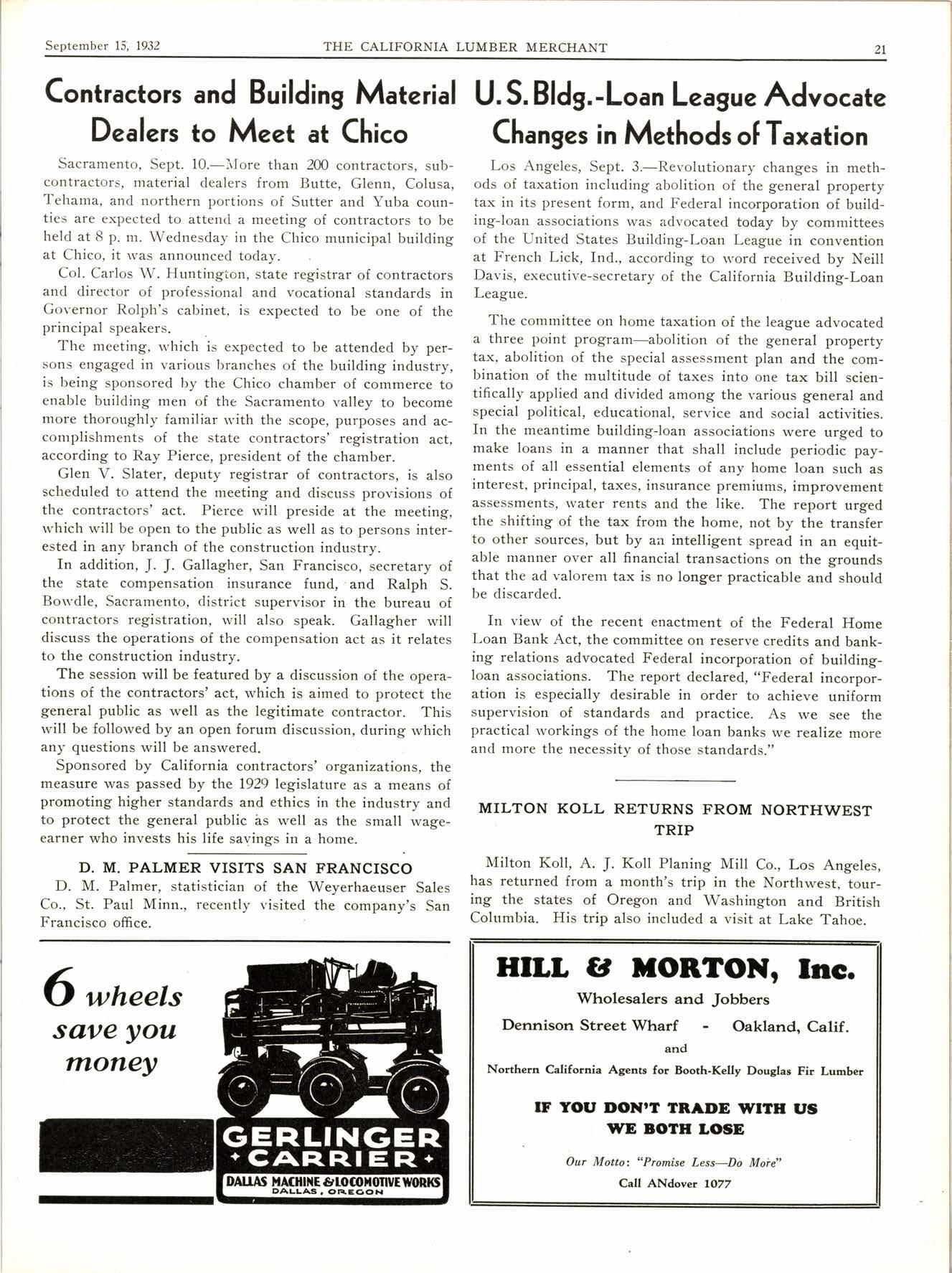
3 minute read
Building Materials Cannot Be Successfullv Sold on Price Basis Alon e---Greatest Factor is Service
Bv J. H. Plunkett General Manager, Pioneer Paper Company
With business taking a definite upturn, it is interesting at this stage to study the effects of the depression upon the building material industry and analyze the possibilities of the future. One important change has taken place, which, I believe, will mean much to the independent retailer of building materials. This change could only have been brought about by a depression, or the slowing up of busi ness to such an extent that distributors everywhere have reached bed-rock in reasoning.
During flush periods, when business is plentiful, it is a human tendency for everyone to grab all the sales in sight. Large concerns spread themselves into many new classifications in an effort to pile up volume and earn added profits.
During lean periods, facts come to the surface in bold relief. It becomes apparent that sales do not always mean profits, and that in many lines service is of more importance than price.
I presume this is what is happening today inside_ the mail order houses and chain store organizations, where financial experts are making close studies of the profit and loss statements in the various departments. When these studies are completed, I feel confident that the mail order concerns and chain stores will begin to realize that building materials can not be successfully sold on the basis of price alone, because the greatest factor in their successful sale is service.
The independent retailer of building materials knows this. lle has realized for years that a building material is not a commodity to be purchased for itself ; it is a part of a completed building, and as such, must be sold by an experienced dealer who can give service and advice.
The independent retailer, who is close to his trade, can give this service. The mail order house, department store, or chain store, can sell only on a machine basis, and can not give this necessary personalized service.
The mail order houses a.nd chain store organizations, in checking their sales and profits by departments, will probably soon realize that the building material end of their business has not been as profitable as they imagined. They will probably soon appreciate that building materials, being of heavy tonnage, require large space. And, being in the nature of specialties, require experienced personalized salesmanship in order to successfully fill the orders of customers.
If the rush for business had continued unabated, mail order houses and chain stores might never have begun checking their profit and loss statements by departments with such care. They would probably not have realized their losses due to defaulted payments on projects which they financed, and long overdue notes on installment accounts. They might have considered their building material business as a healthy unit of their volume.
But, with close analysis, they will find that in many instances, what seemed to be profits were really losses, all things taken into consideration. The independent dealer, on the other hand, is equipped to handle building materials successfully. He is geared into a close relationship with the local trade; he knows the builder, contractor and owner; he knows their problems. He is ready, willing and able to help with advice, recommbndations and experience. He does not sell commodities at a price, in competition with the mail order houses and chain stores. What he sells is 5slviss-4nd the commodities which he stocks are necessary to perform that service.
The building material dealer is a specialist. The mail order houses and chain stores are not specialists. They sell on a basis of price alone, which may be a successful method with some items, but with building materials service is so important that price alone can never be the standard of success in sales.
As the mail order houses and chain stores begin to realize this fact, and discover the truth of profit and loss in their own operations, they will begin to shy off from building materials more and more, leaving the field to the specialist-the independent dealer.
It is the responsibility of the independent dealer to fully prepare himself for this future. IIe should get his house in order, with proper displays, well organized stocks, and every facility for service.
He should then aggressively come out into the open in his home territory and tell the public, forcefully and often, that he has a real service to offer in addition to a full line of building materials. Unless the independent retailer takes his rightful place in the field; unless he goes after business actively, fighting for what belongs to him, he may again lose to some other type of competition in the future-and it would be entirely a loss bv default.
Opens Branch Store at Htshland Park
The \,V. E. Cooper Lumber Company has opened a branch store at Highland Park, Calif., with W. M. Davies in charge, where they will carry a complete stock of hardwood and softwood lumber and building materials. The company's main yard is at 2035.Fifteenth street, Los Angeles,









